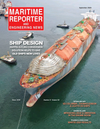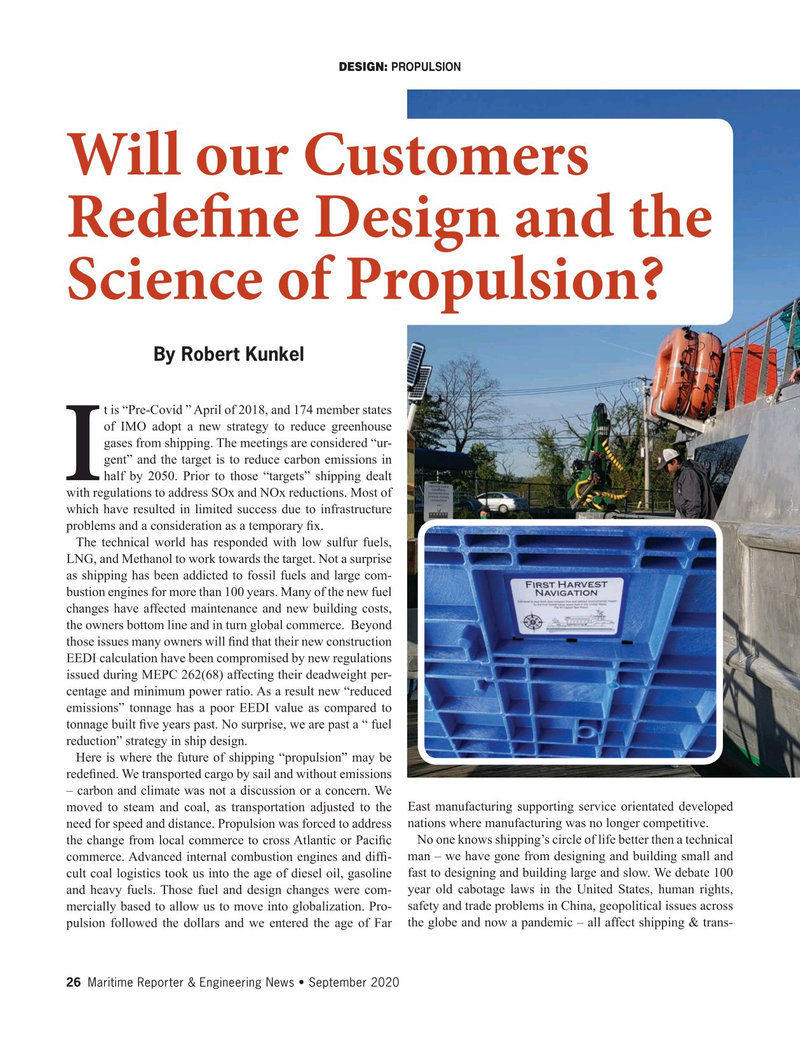
Page 26: of Maritime Reporter Magazine (September 2020)
Marine Design Annual
Read this page in Pdf, Flash or Html5 edition of September 2020 Maritime Reporter Magazine
DESIGN: PROPULSION
Will our Customers
Redef ne Design and the
Science of Propulsion?
By Robert Kunkel t is “Pre-Covid ” April of 2018, and 174 member states of IMO adopt a new strategy to reduce greenhouse gases from shipping. The meetings are considered “ur- gent” and the target is to reduce carbon emissions in
Ihalf by 2050. Prior to those “targets” shipping dealt with regulations to address SOx and NOx reductions. Most of which have resulted in limited success due to infrastructure problems and a consideration as a temporary ? x.
The technical world has responded with low sulfur fuels,
LNG, and Methanol to work towards the target. Not a surprise as shipping has been addicted to fossil fuels and large com- bustion engines for more than 100 years. Many of the new fuel changes have affected maintenance and new building costs, the owners bottom line and in turn global commerce. Beyond those issues many owners will ? nd that their new construction
EEDI calculation have been compromised by new regulations issued during MEPC 262(68) affecting their deadweight per- centage and minimum power ratio. As a result new “reduced emissions” tonnage has a poor EEDI value as compared to tonnage built ? ve years past. No surprise, we are past a “ fuel reduction” strategy in ship design.
Here is where the future of shipping “propulsion” may be rede? ned. We transported cargo by sail and without emissions – carbon and climate was not a discussion or a concern. We moved to steam and coal, as transportation adjusted to the East manufacturing supporting service orientated developed need for speed and distance. Propulsion was forced to address nations where manufacturing was no longer competitive.
the change from local commerce to cross Atlantic or Paci? c No one knows shipping’s circle of life better then a technical commerce. Advanced internal combustion engines and dif? - man – we have gone from designing and building small and cult coal logistics took us into the age of diesel oil, gasoline fast to designing and building large and slow. We debate 100 and heavy fuels. Those fuel and design changes were com- year old cabotage laws in the United States, human rights, mercially based to allow us to move into globalization. Pro- safety and trade problems in China, geopolitical issues across pulsion followed the dollars and we entered the age of Far the globe and now a pandemic – all affect shipping & trans- 26 Maritime Reporter & Engineering News • September 2020
MR #9 (18-33).indd 26 9/9/2020 8:15:37 AM

 25
25

 27
27
